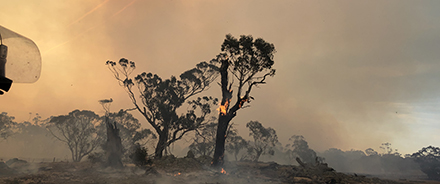The NSW Government has agreed that the summer’s devastating bushfires in the south east of the state were caused by mix of climate change, drought and high fuel loads on the ground. In doing so, it has accepted all 76 recommendations of the independent NSW Bushfire Inquiry, which examined the causes, preparation and response to the bushfires. Source: Timberbiz
Any issues not covered in the report that are still relevant to the protection of property and life will also be further examined.
Resilience NSW, led by Commissioner Shane Fitzsimmons, has been tasked with coordinating and overseeing the implementation of the Inquiry’s recommendations as the government finalises its approach.
“The NSW Government has worked in lock-step with the RFS and Resilience NSW to ensure the state is as prepared as it can be to face the next fire season, but the learnings from this Inquiry will help us further improve our preparedness and response,” Premier Gladys Berejiklian said.
“The NSW Government has already delivered more than $45 million in additional funding, announced in May 2020, to fast-track hazard reduction and deliver upgrades to our firefighting capability.
“This was a terrible bushfire season and we will look at all the steps we can take, especially in relation to helping people protect their property.”
The report recommends more hazard-reduction burns in closer proximity to endangered communities, and hazard-reduction burns and water bombing conducted at night.
The report also acknowledges the significant contribution of both climate change and the vast expanse of the state’s bushland towards these devastating fires.
And it has encouraged the establishment of a “major world centre” of bushfire research in NSW and the creation of a bushfire-fighting technology fund.
A trial will also be conducted of first-response aerial firefighting, which involves water bombers being deployed ahead of firefighters to reduce the intensity of blazes.
“There were unprecedented conditions coupled with the drought, the fuel loads in some areas, but moreover that the climate is changing, and we have to accept and expect that part of the ferocity we saw was a combination of those things,” Ms Berejiklian said.
“Our government is working as hard as we can, as fast, as efficiently as we can to resource up our agencies but also do everything, we can to mitigate the risk.”
Deputy Premier John Barilaro said all 76 recommendations in the Inquiry are based on the harsh lessons learnt from the catastrophic bushfires of last summer.
“Last bushfire season was unlike anything we have ever dealt with before and we need a government response to match,” Mr Barilaro said.
“Things like strategic hazard reduction and better land management no matter the tenure are essential when it comes to keeping our communities safe.”
Minister for Police and Emergency Services David Elliott said NSW is now more prepared than ever before for the 2020-21 fire season.
“We have already begun implementing the Inquiry’s recommendation to replace and retrofit the fleet, with 120 new trucks and 70 refurbished trucks to be rolled out before the end of the financial year,” Mr Elliott said.
“I would like to thank all our emergency personnel and volunteers who made us all proud over this relentless bushfire season.”






